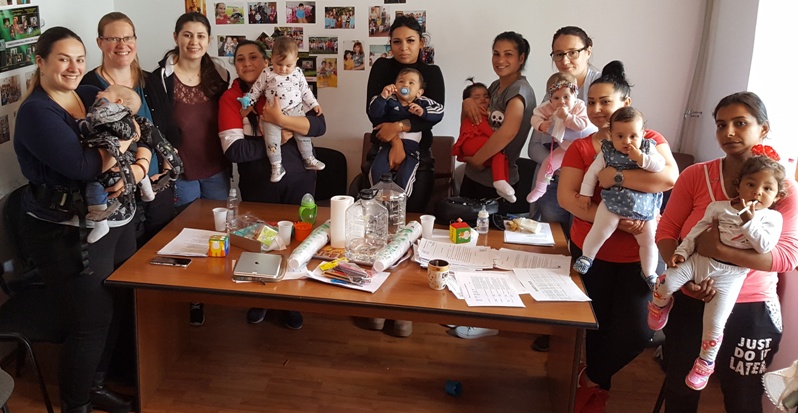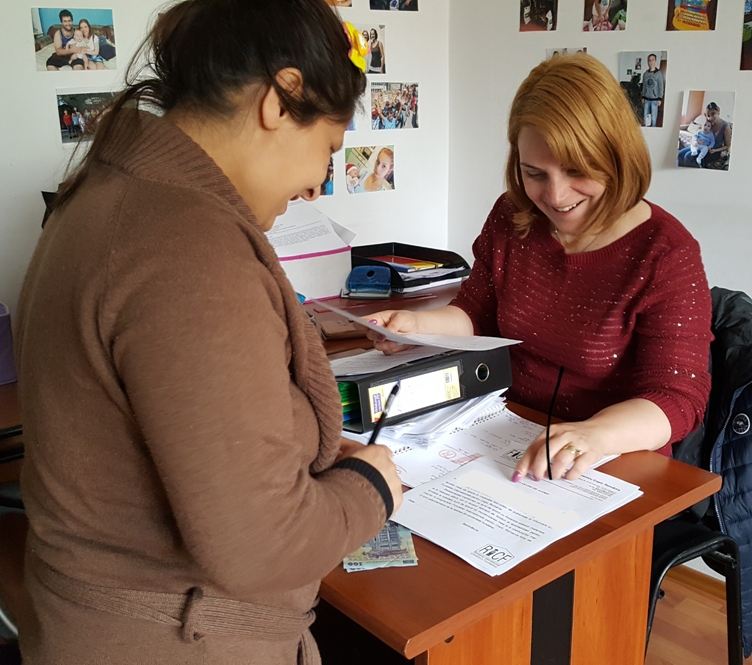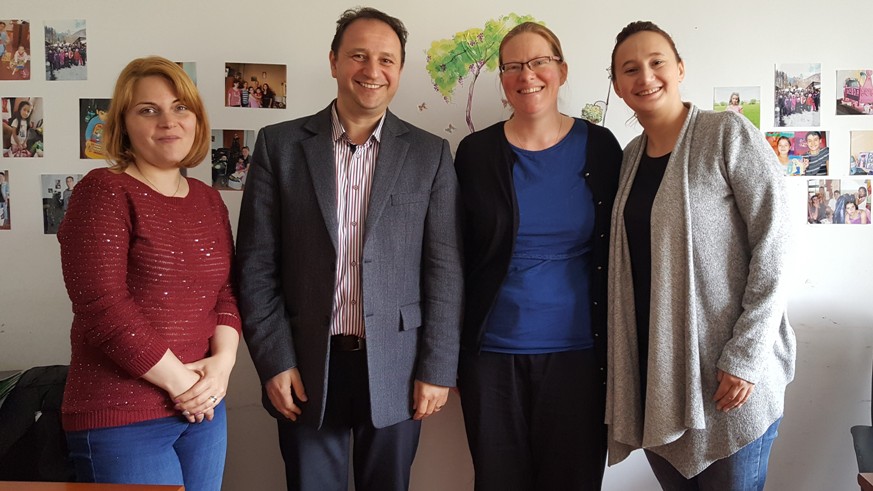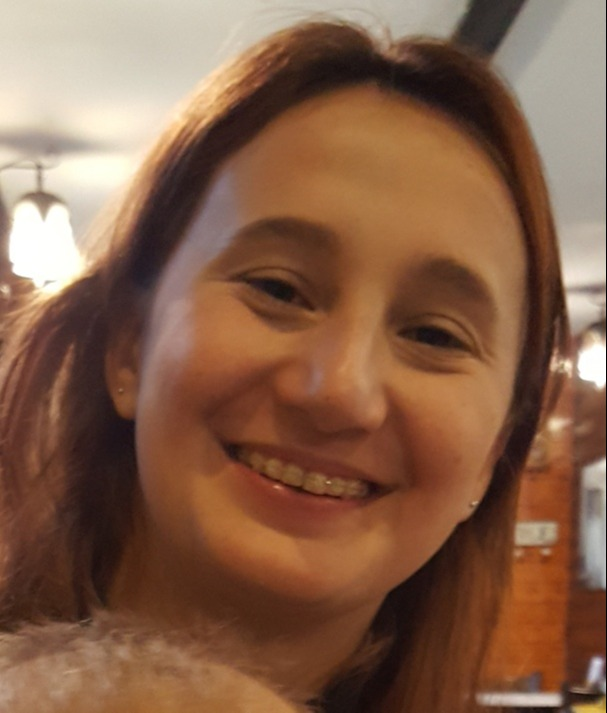May 2019 Update

Thank you so much again for your support and encouragement. I have just returned from a trip to Bucharest, catching up with the HQ team and meeting the current mums and babies in our abandonment prevention project (above) and also our team of foster carers, some of whom I have known for years, and others of whom I was meeting for the first time.
One of the highlights of my visit was two different opportunities to meet up with previous RICF beneficiaries now living and working independently, one now 22 years old and the other in his 30s. It is so humbling to see the impact RICF has had in these young men's lives and I am so grateful to all our supporters who have believed in what we are doing and have given financially to make it possible rather than just a dream. I was reminded that when I came back from Romania as a 19 year old gap year student and asked for financial support to care for abandoned children rescued from the streets of Bucharest, I was in no position at all to offer financial support myself. It has been amazing teamwork over the last 23 years which has allowed different individuals to offer what they could - time, expertise, money, prayer support, clothes and equipment etc and together it has made a huge impact.
Abandonment prevention project
 It was fantastic to hear we have now helped 86 mum and baby pairs in our abandonment prevention project since it started just over 9 years ago. During my visit I was fortunate to be there for the graduation of one of the mum and baby pairs, who were attending their last support group meeting, and also to be there for the enrolment of a new mum and baby pair the following day. I was in the office while Simona, who oversees this project, explained to a new mum enrolling in the project some of what to expect.
It was fantastic to hear we have now helped 86 mum and baby pairs in our abandonment prevention project since it started just over 9 years ago. During my visit I was fortunate to be there for the graduation of one of the mum and baby pairs, who were attending their last support group meeting, and also to be there for the enrolment of a new mum and baby pair the following day. I was in the office while Simona, who oversees this project, explained to a new mum enrolling in the project some of what to expect.
On average mums spend 12 months in the project, but some graduate more quickly if they need less support, and occasionally mums spend longer in the project if they are facing more difficult circumstances. At the monthly support meetings they discuss a different topic each time, facilitated by Simona, in addition to any matters that have arisen during the month that haven't already been dealt wit through their Whatsapp group. While I was there they discussed weaning and the childhood vaccine schedule in Romania - I was pleased to hear measles protection is offered and being taken up by the group members. The mothers receive financial support from RICF, which starts at 300 RON per month (currently about £55) then decreases through the year to avoid creating financial dependency. The mums all have different stories and benefit from the mutual support and friendship with other group members as well as the advice and professional advocacy from Simona and other members of the RICF HQ team. We are currently supporting 12 mums with 13 children (one mum has twins) in this project.
A family for me foster care project
At the foster carers' support meeting, they usually start by discussing any urgent situations that have arisen in their families, followed by all the month's news for each of the children in their care. They then move on to a facilitated discussion on a topic agreed the previous month, facilitated by social worker Emilia. They really appreciate the mutual support and opportunity to ask each other for ideas on how to tackle various conflicts or behavioural concerns. They feel the sessions are like a therapy and appreciate the chance to talk with each other and express themselves. Several of them mentioned that it feels like a family. 'We can open up and discuss anything. We are listened to.' One theme emerging from the meeting I attended was how they sometimes have to really fight to get what the children in their care need. From their experience children in care can face discrimination in school and extracurricular activities. Accessing paperwork such as authorisations for children to attend school trips or accompany the family on planned holidays also seemed to be a problem. Another part of the meeting that the foster carers really appreciate is when they read from The Bible and pray together, and sing worship songs. This is optional for the foster carers but has been something they have been choosing to do as they find it builds their personal faith. We continue to support 14 foster carers caring for 17 children and young people.
Our RICF HQ team

It was great to have time to catch up with the HQ team (Simona, Ovidiu and Emilia). As well as a long discussion about each of RICF's projects, where we are facing hurdles and ideas for overcoming them, and setting key objectives for the next 6 months, it was great to chat with each of these special people individually, to better understand their hopes and aspirations for the future. Emilia is our most recent addition to the core team, and is a real blessing to us all, full of energy, positivity and a real love for the people she is working with. She is responsible for our foster care project and facilitates the support meetings with our foster carers. She also meets up individually with foster carers and the children and young people in their placements to listen and offer advice. She will soon start meeting up regularly individually over a coffee or juice with our 16-18 year old young people in foster care to help them formulate their plans for the future as well as learning skills such as budgeting, keeping themselves safe in relationships, internet safety, finding and keeping employment etc. Previously we had been running a group support meeting for our teenagers but the current group have school at different times and live quite far apart and it was felt individual mentoring type meetings would work best for them.
I had the opportunity to ask Emilia some questions about her time with RICF so far and found her responses very encouraging.

How long have you been working with FICR and what attracted you to work with this organisation?
My name is Emilia and I have been working as a social worker with FICR for three and a half years. I got to know the foundation while I was at university and I was very impressed by the large amount of personal contact that the team have with the project beneficiaries. Alongside the essential paperwork which all social workers have to do, the team reserve a large proportion of their time for the beneficiaries. Since then I knew I wanted to work at the foundation, so I could be close to people, not just to their files and paperwork, as can happen in the system.
What do you like most about your work with FICR?
Definitely the meetings we arrange with our beneficiaries, in the form of support groups. As well as analysing the development of children within their families / foster families, I find the devotional time really unique, when we can sing, read from The Bible and pray for those in need.
Which achievement are you most proud of in your work with FICR up until now?
The achievement that helped me realise how important our impact is, as specialists within FICR, is the outcomes I see in the young people completing their foster placements. I am referring to young people who have fought for many years with wanting to give up on school, with vices such as alcohol and smoking, who have run away from home and declared many times that they want their placement to end….that now they are adults they are managing to have a harmonious relationship with the foster carer's family, are working and thinking about their own plans for a family one day. The years of listening, advising and maintaining contact with the schools and the foster carers' families, all trying to get the young people to complete their studies and to sustain them until they become adults capable of looking after themselves... the benefits can be seen years later. There are many young people like this who have passed through our care who are now living independently and still keep in touch.
From your experience what difference does FICR make in the lives of our beneficiaries?
Over time I have volunteered and worked in other foundations too... but to be a beneficiary within FICR has seemed to me to be something unique. We have beneficiaries who without our help would certainly have abandoned their children or interrupted their (foster) placement. The problems faced by our beneficiaries are vast, but the mothers / foster mothers discover here that they are not alone and that they are understood and supported, not just materially but also spiritually. The relationships in the group are very close. There are mothers and foster mothers who have kept in touch with the team but also with other beneficiaries after completing the project.
What's coming up?
In August our team are looking forward to a visit by a representative of Remember Nhu, to whom we are very grateful for their financial support which has allowed us to increase the number of beneficiaries in our two core projects. He will participate in our support groups and visit the homes of children in foster care and mums and babies being supported in our abandonment prevention project.
Over the summer we also hope to organise an exchange of experience with a couple of small Bucharest foundations who have some overlap with our projects, so we can share ideas and learn from each other. We now have the full accreditation for carrying out training for people wishing to become foster carers and are looking into how this can be rolled out with participants over the next few months.